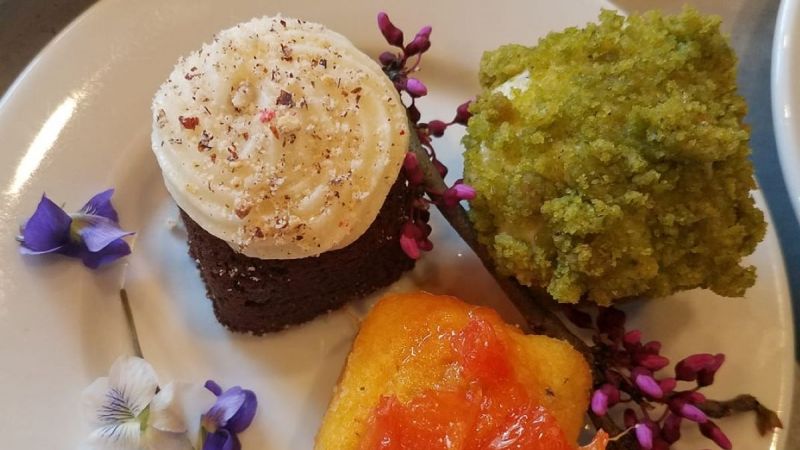Heidi Leuszler is an absolute powerhouse of the Champaign-Urbana baking scene. She is an ecologist and cottage baker with a flair for blending indigenous Midwest flora with her keen flavor instincts. Her work has been showcased in such events as Allerton’s Forest to Mansion dinners and The Land Connection’s Artisan Cup & Fork dinners. Locals have probably also sampled her treats at the Farmers’ Market in Champaign or the Mistletoe Market in Urbana (or The Little Red Hut) at Christmas.
I first met Heidi while covering fruitcakes for Smile Politely during the 2020 holiday season. One bite of her Midwest black cake, and I knew: Heidi is a magician with flavors. While sitting across from her at her patio table, masked and notebook in hand, I was fascinated and inspired to learn more about Heidi’s journey from ecologist to cottage baker.
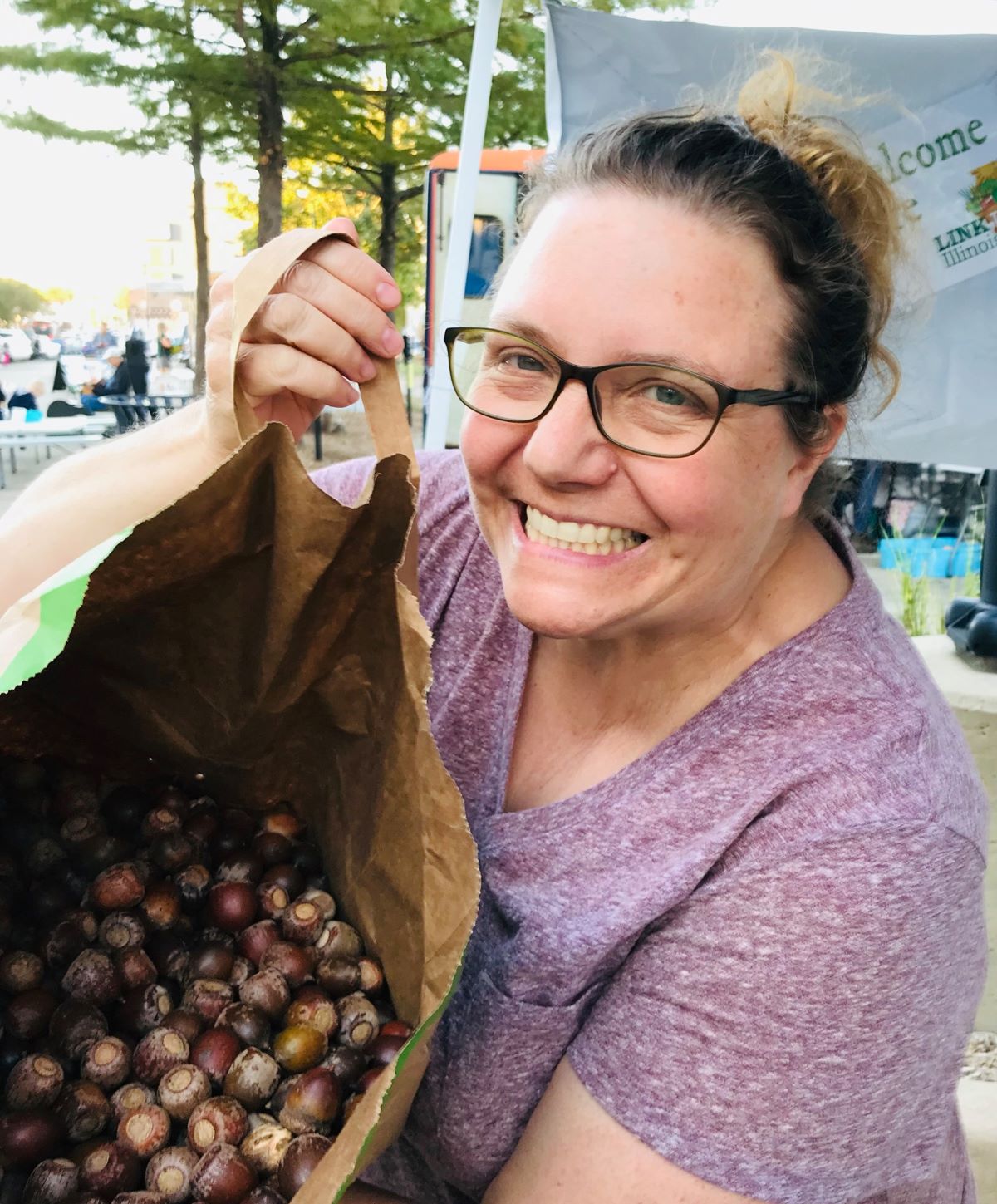
Photo by Eliana Brown.
Smile Politely: Hi, Heidi! Could you tell us a little bit about yourself?
Heidi Leuszler: This is always my least favorite question. I hope I am leading an interesting life full of good relationships and experiences in the wild.
I grew up in Florida, Missouri, and Colorado. We traveled as much as we could, but we also appreciated knowing where we were. When I went to college at Knox College in Galesburg, Illinois, my parents and sister moved to Japan, so “home” had several meanings. After Knox, I went to Utah State University and studied prairie ecology, pollination biology, population genetics, and, later, plant reproductive success in North Dakota. I then moved to Champaign to work as a biology professor at Parkland College. I adore the job and have been there for 25 years.
I have a lovely, close family, and we have created a beautiful home on five acres of tallgrass prairie and two acres of fruit and nut trees and gardens. As an ecologist by training, I have been planting native species on our land. In the last eight years, I have been studying sustainable agriculture and permaculture, turning our land into a more productive farm.
SP: When and how did you begin baking?
Leuszler: I have been baking for as long as I can remember. Cornbread with Grandma Sly, pie crusts with Momma. My parents were part of a gourmet dinner club, and we always cooked fabulous things. Whenever we traveled, food was always part of wherever we were. I learned that good food could be prepared as quickly as pre-prepared items from the grocery store, and I still love to try new recipes and re-create old ones. Thirty years ago, I started making bread and sourdough. I have always loved pies, and I have moved into cakes in the past ten years. Frankly, you learn the most from owning your own bakery. Just practice and experience.
SP: How old is Berries and Flour now?
Leuszler: We started the bakery in June 2016.
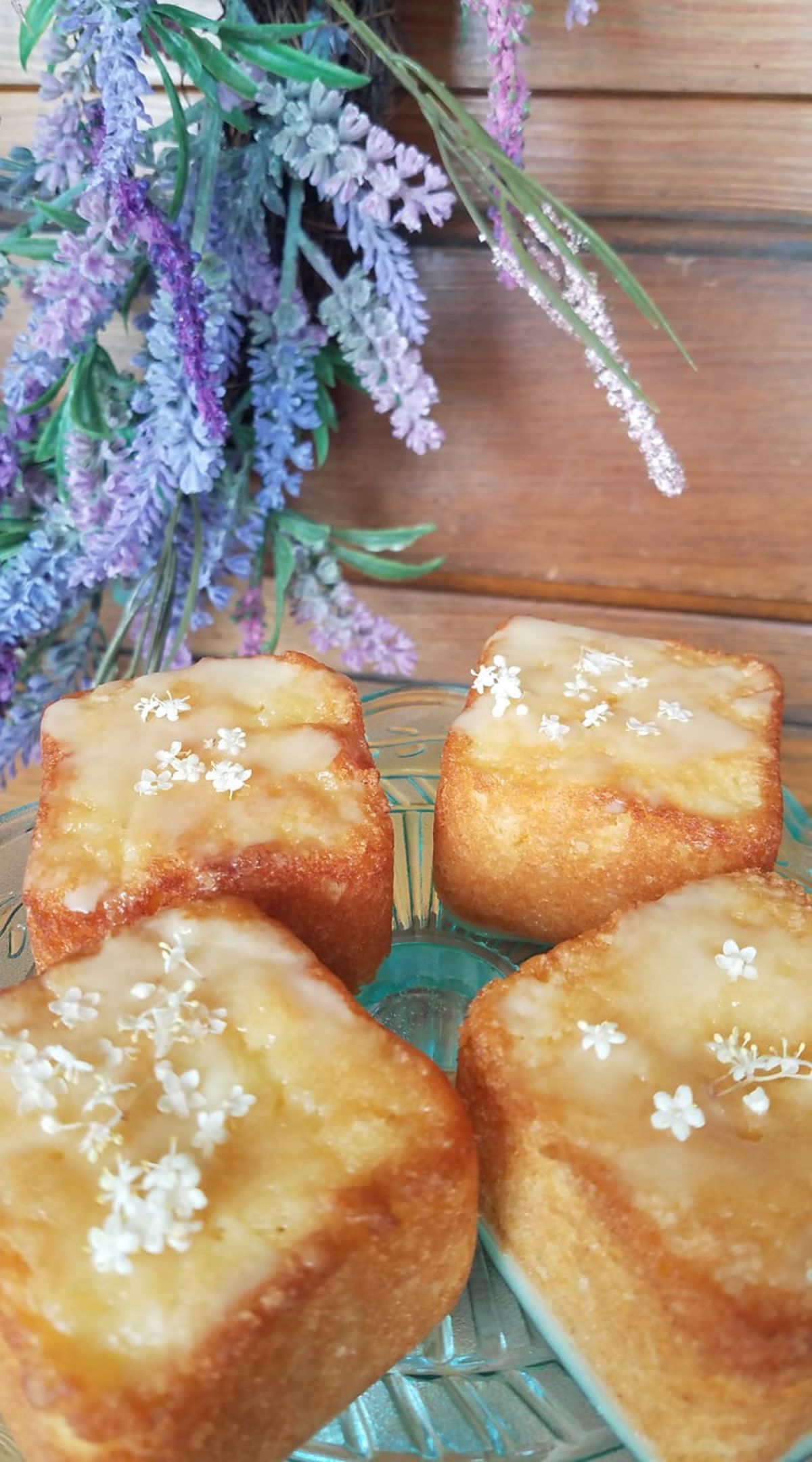
Photo by Heidi Leuszler.
SP: Can you tell us about the concept behind Berries and Flour? How did you come by it?
Leuszler: I am a proponent of local agriculture, particularly sustainable agriculture. Growing perennial crops, farming native plants that are more adapted to a region, expanding our palettes, and bringing food production back into the local economy are parts of sustainable agriculture that I think Berries and Flour supports. Everything we make contains plants that grew right here in our area, whether from the fields, the farm, or the forest.
My daughter, who was nine when we started the business, also loves to cook and has an entrepreneurial spirit. Long story short, we decided to start a baking business together. Through research and conversations with the Champaign County Department of Public Health, it made the most sense to start a Cottage Food Operation. The business concept took shape over the months it took to get all of the food safety certifications and business licenses and discuss the cottage food laws with the Champaign County Department of Public Health.
The full name of our business is “Berries and Flour: Bakery and Harvest Goods” because I knew I would want to expand from baked goods to other products. That first season at the Champaign Farmers’ Market was pretty crazy, and I am glad we started small and only made our signature small square cakes. We learned how the market worked and created our own niche, focusing on native flavors that we already grew on our farm.
By the second season, we had crowdsourced a new logo and added pies, larger cakes, jam, and candies to our product line. In the third season, we brought in more non-perishable products with shrub concentrates (a sweet, acidic colonial American drink), syrups, and dry tea. Next, we added our popular wild cocktail kits and rimming salts and sugars. Not surprisingly, these kits have been popular during the pandemic.
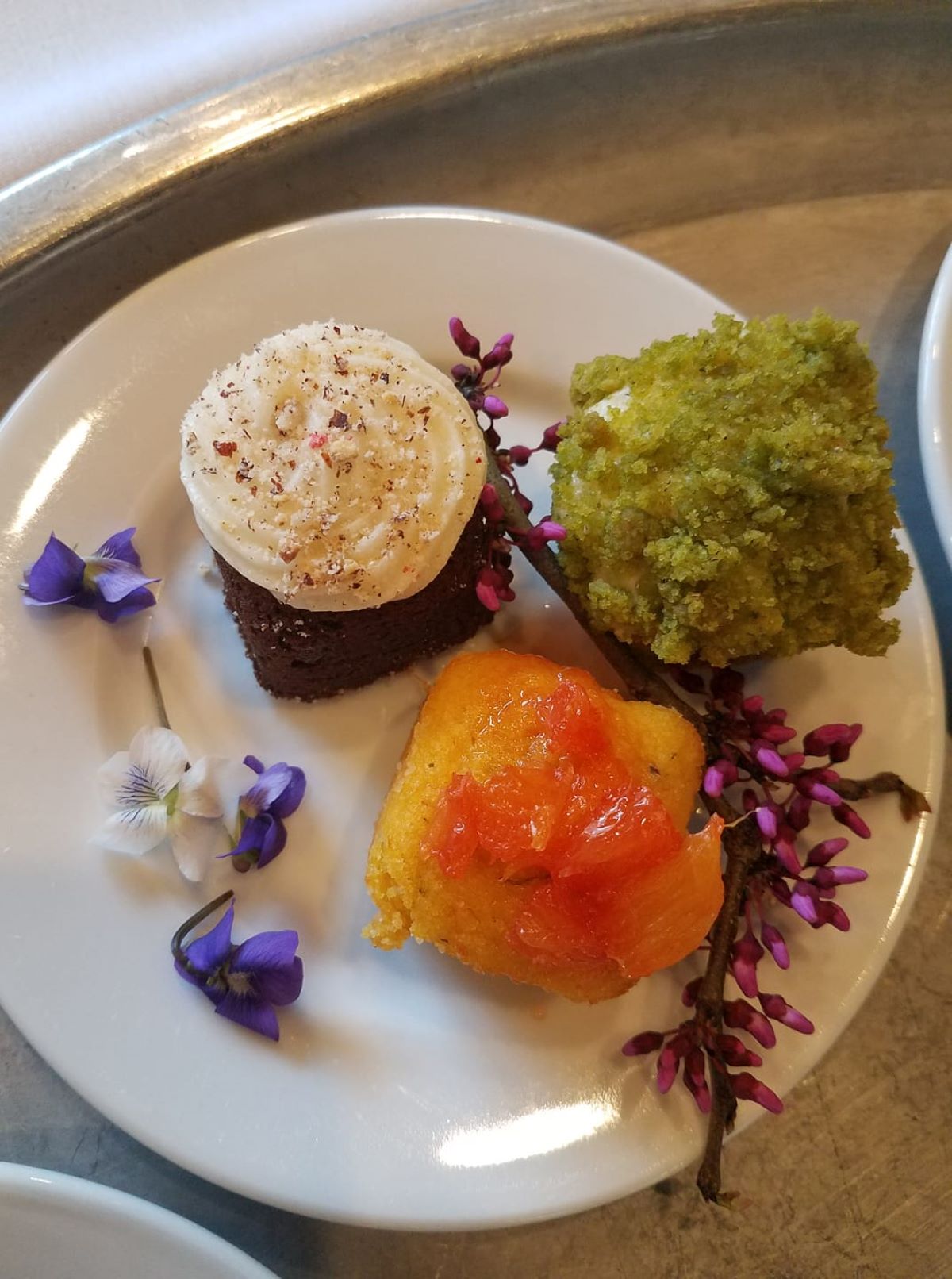
Photo by Nate Becca.
SP: You’re considered a cottage baker. Can you tell our readers what this means?
Leuszler: Cottage Food Operation is a special category of the food business where I can bake from my home kitchen and sell directly to the consumer via farmers’ markets and online sales. (Please note that I can do online sales because we grow our signature ingredients on our farm; most cottage operators can only sell at farmers’ markets right now). All cottage operations have restaurant-standard food safety licensing requirements of the makers, and although we are registered with our county Department of Public Health, the home kitchen is not officially inspected. Understanding the different permits for food businesses has been another learning curve, but food safety is always at the center of any registered food operation.
SP: Where do you find your ingredients?
Leuszler: I find ingredients in several ways. We grow our own fruit and nuts like elderflower, elderberries, blackberries, Redbud flowers, Concord grapes, peaches, apples, spruce, lilacs, violets, and pawpaws.
I walk around the local farmers’ markets and choose fruits and vegetables that are seasonal. Some produce would be obviously for desserts, like raspberries, but I also source things that are not common in cakes like green tomatoes or rutabagas.
Most of the wild crops I use are grown on our farm, but I do forage from places I have permission to do so and which are safe from pesticides and pollutants. I have also hired a few people to forage from their safe spaces. Over the years, I have nurtured relationships with local farmers and gardeners. I harvest, buy, or barter for flour, eggs, dairy, fruit and vegetables, nuts, and edible flowers directly from them. I also supplement with as much produce grown directly by farmers, even if it isn’t local. For example, I get boxes of blueberries from Michigan and hickory nuts from Wisconsin and Indiana. Lastly, of course, I get some ingredients from the grocery store.
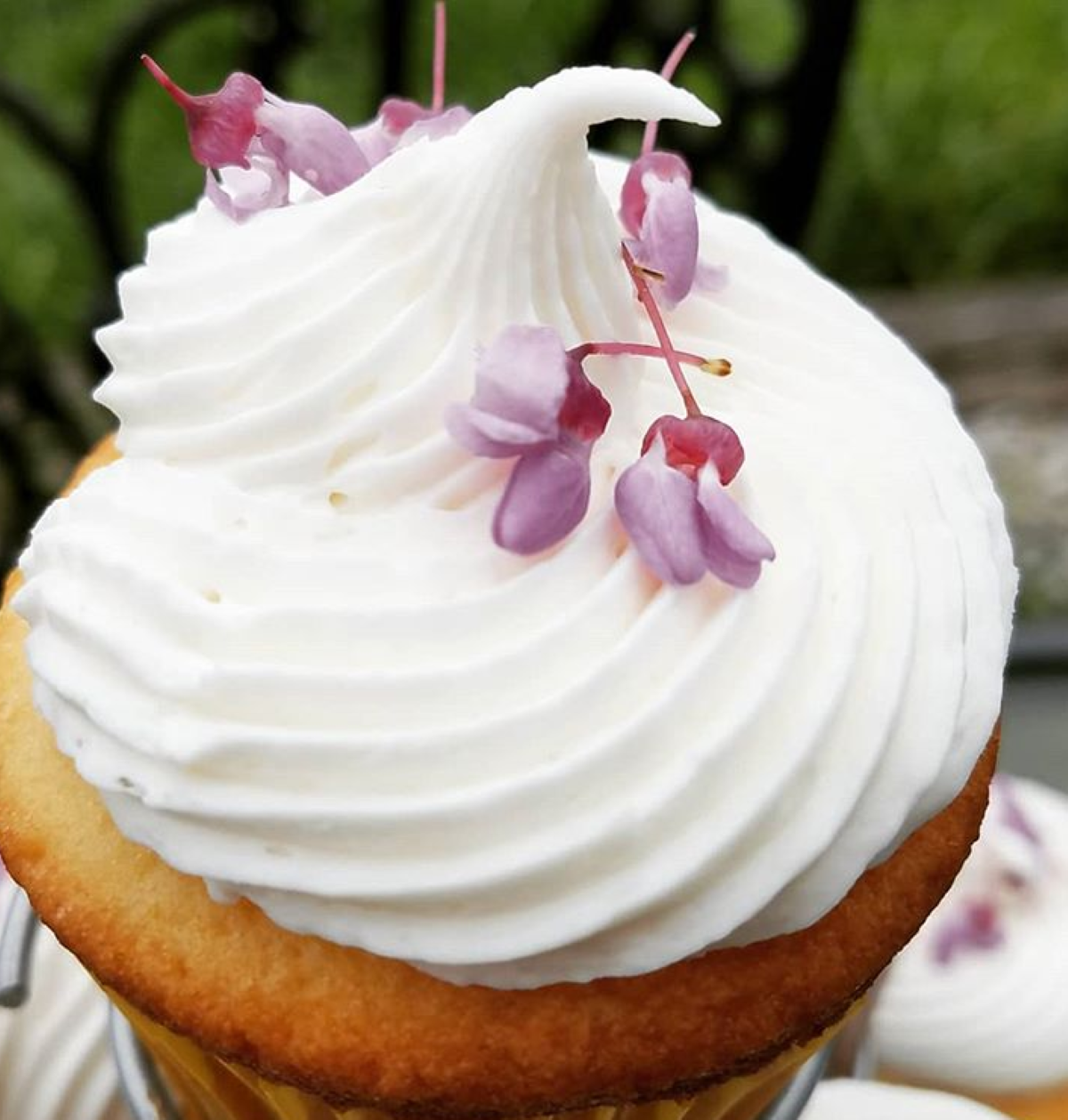
Photo by Heidi Leuszler.
SP: Your recipes and bakes are as unique as your ingredients. Where do you find your inspiration?
Leuszler: Luckily, I have a good imagination, and I use it to partner flavors with one another. I have studied flavor structure and how to make a good overall flavor (like how much bitter to sweet).
I love reading old cookbooks! Some of the flavors I work with are not new, and there is a lot of cultural history in old cookbooks. I have also learned a great deal from patrons. People from other countries send me their old family recipes or grandmothers explain how they used to cook something, and I get a special commissioned order. Being part of the farmers’ markets and talking with people, both vendors and visitors, often inspires something! And of course, there is the internet and all of its creativity.
SP: You’ve mentioned that you’re a professor and baker. How do you balance teaching and baking? Do the two intersect?
Leuszler: The bakery is a family business, so everyone helps out sometimes, but it can get tough. I have given up on finding a balance because the workload of both my full-time job and the bakery is not consistent. Sometimes, each is a lot of work and, at other times, there is less to do. I have had to be content with keeping the bakery small and saying no to a few orders. Also, I can only do orders I can plan ahead of time, so I make sure to carve out the time it takes to make, decorate, package, and label something.
The two definitely intersect, although I would probably say this is mostly for me personally. Everything I have ever studied has come together in the bakery. I use the science I know to help me harvest, plant, and cook. For me, the bakery has really tied together every field of study I have embarked on: food, ethnobotany, history, ecology, agriculture, pollination, and prairie.
I will say also say that, although tricky to balance sometimes, I am in a luxurious spot; I have a fantastic job, so a lean farm or bakery season is not detrimental to my overall life. I can thus use the bakery and that resilience to support other local farms and businesses that do not have the same flexibility.

Photo by Alyssa Buckley.
SP: I saw that you contributed to the Artisan Cup & Fork 2020 event? What was that like?
Leuszler: I have been honored to be a part of The Land Connection’s Artisan Cup & Fork for a few years. I was personally hired to cater the event, not as Berries and Flour. These events have been chaotic and incredibly fun. I greatly admire those who cook for large groups a lot. I could never have done these events without commercial kitchen space from local businesses and the restaurant and catering experience of local chefs I have been able to work with. Together, we have made new recipes for these events with the native crops we grow on our farm, reintroducing the flavors of the Midwest to folks, and supporting the mission of The Land Connection.
2020 was different because I was a competitor; that definitely added a new dimension to both the planning and execution of my dessert. I think I must have made ten different versions of my pawpaw baklava until I felt the balance of honey, plantain, pawpaw, and hickory nuts was right! I had the pleasure of working in the Wood N’ Hog kitchen with their chefs. Learning a new kitchen can be tricky, but the folks there were incredibly welcoming to a new person in their kitchen.
SP: How has the pandemic changed your business practices (if at all)? Have you found new ways to reach your customers?
Leuszler: I was in an accident at the beginning of the pandemic, so I was unable to participate in the 2020 Farmers’ Market season. I had a few new opportunities for selling, but the pandemic stopped those. I do hope to hire someone for the 2021 market season, if anyone is interested.
Once I got back on my feet and reopened, I have been doing steady business. Being at home more has given me more opportunities to expand what I do on social media. We collaborated with The Little Red Hut over the winter holiday season and hope to continue that relationship. I added delivery in the C-U area, and I started a subscription for a harvest good-a-month. Subscribers get something yummy delivered to their door once a month. I have to keep the number of subscribers low, but I have room for a few more.
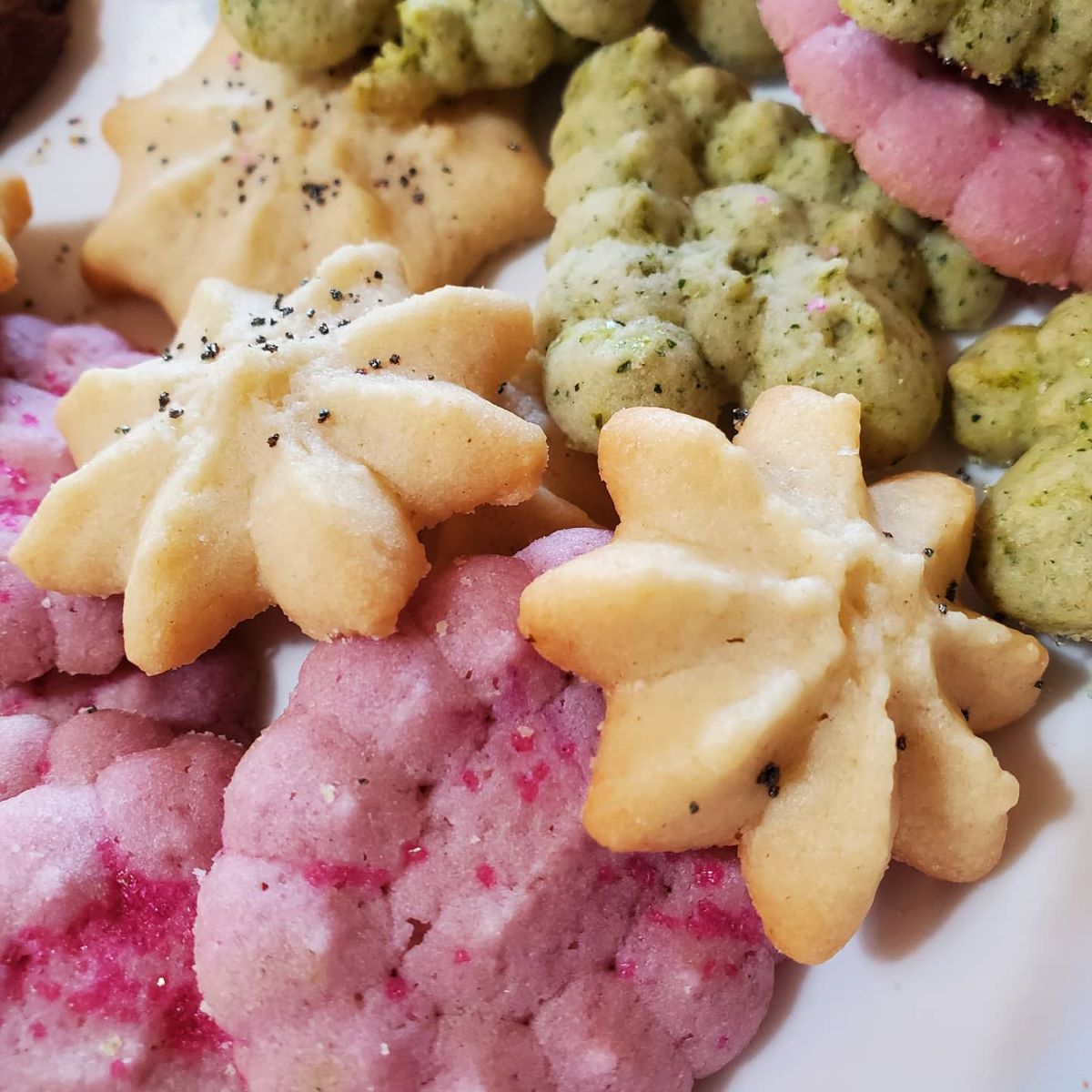
Photo by Heidi Leuszler.
SP: Does your menu change weekly? Where can we find what you’re serving up?
Leuszler: I have been doing a monthly menu change, promoting seasonal produce and some new recipes. Honestly, all of the favorites are available as long as I have the produce needed. I am working on being more consistent about sending out a monthly email with featured menu items and posting what I am making on social media. Otherwise, I have a list of items on my website. I have also been known to make special requests (like acorn cakes).
SP: How can C-U baked goods lovers order your baked goods?
Leuszler: The best way to order things is through my website, email, or social media pages like Facebook and Instagram.
SP: Is there anything else you’d like to tell our readers?
Leuszler: Foraging is not to be taken lightly. You must absolutely know how to identify the edible species you are looking for. You must absolutely have the permission of the landowner to harvest there.
Although I want to highlight wild flavors, my intention is not to cause the overuse or damage of the areas where these species can be found. If you are interested in foraging, connect with me or groups in the area that help you properly identify plants and learn responsible harvesting practices.
Thanks so much, Heidi!








